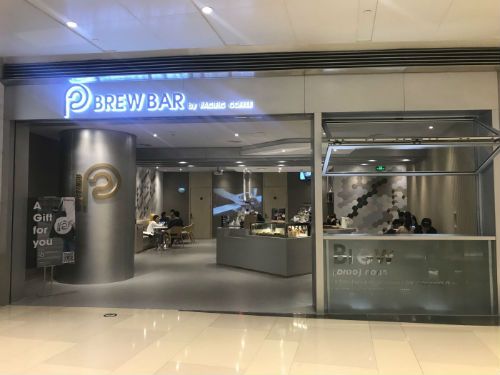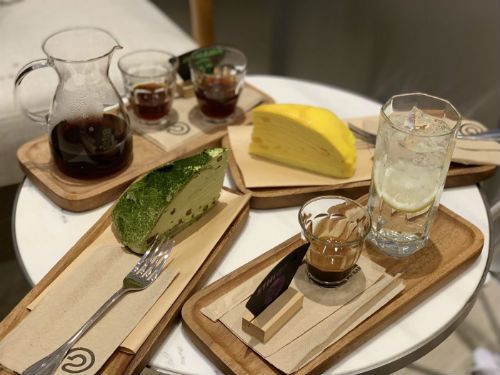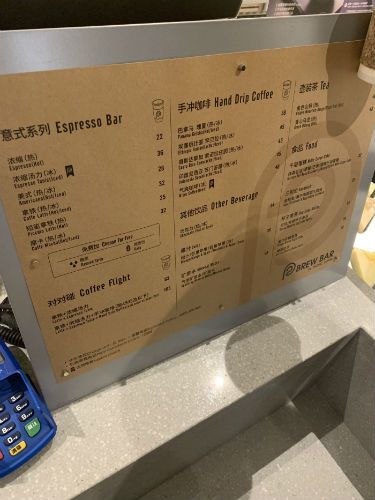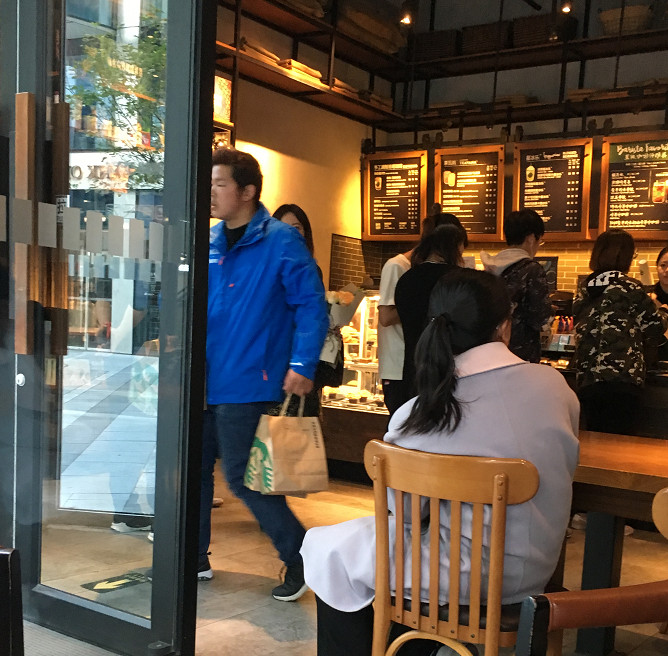Pacific Coffee localization unfavorable launch upgrade brand to enter the "boutique coffee" market

Professional coffee knowledge exchange More coffee bean information Please pay attention to coffee workshop (Weixin Official Accounts cafe_style)
Repeated attempts to introduce local elements such as national wine and tea into the product have failed, Pacific Coffee tries to enter the "boutique" market, opens the boutique coffee store Brew Bar to the International Trade Mall, marks the coffee beans growth altitude, processing method, processing station, roasting degree and other details, and focuses on coffee beans from a single producing area. Industry analysts believe that the current boutique coffee market share is not very prominent, boutique coffee shops in the blue sea whether the emergence of a new force has yet to be tested by the market.
Enter the "boutique" market
Beijing Business Daily reporter recently visited found that Pacific Coffee launched the first boutique coffee shop Brew Bar, located in Beijing International Trade Mall North District underground first floor. There is currently only one store in the country.
The reporter saw at the scene that the overall design style and product types of Brew Bar coffee shop are very different from those of Pacific Coffee in the past. The main color of the store is mainly white, and the design is more inclined to the style of "net red". At present, only coffee, tea, cakes, sandwiches and other goods are sold in the store, and there are fewer categories than Pacific Coffee. In terms of price, the price of hand-brewed coffee is about 48 yuan, which is slightly higher than that of similar coffee brands on the market. There will be labels beside the goods to mark the commodity information, such as hand-brewed coffee will mark the growth altitude of coffee beans, processing method, processing station, roasting degree and other details.
It is worth noting that Brew Bar's coffee products feature the concept of "single origin raw materials". According to the shop assistant, the store raw materials, menu and Pacific coffee are different, no matter milk coffee or hand-brewed coffee are selected from a single production area coffee beans for production, such as Ethiopia, Indonesia, Panama, etc., and in the degree of roasting all choose light roasting.
In response to questions about the new strategic layout of Pacific Coffee, Beijing Business Daily reporters have repeatedly communicated with Pacific Coffee Company for interviews, but as of press time, no reply has been received.
According to an industry insider who declined to be named, the choice of coffee beans from a single producing area or mixed producing area only represents a choice of flavor, which is convenient to reflect the characteristics of property rights, but it cannot be considered that coffee beans from a single producing area are better as raw materials. However, he also admitted that at present, domestic consumers do not know enough about coffee culture and products, and the market needs to be cultivated gradually.
On the basis of certain popularity of the original brand, it is common to open the grade difference and launch the method of upgrading the brand. Among the catering brands, Xiabu launched the hot pot sub-brand of "Qiatou", and KFC launched the sub-brand of "KPRO". Starbucks launched Starbucks Select Roasting Workshop as early as 2014. According to its official website, six select coffee shops have been opened in Beijing.


localization disadvantage
With fierce competition in the coffee market and innovative model layout of various brands, Pacific Coffee is under great pressure. The coffee market in China was initially dominated by instant coffee, and then Starbucks promoted freshly ground coffee. At present, Starbucks has more than 3000 stores nationwide and more than 300 stores in Beijing. Not long ago, new entrants Internet coffee Ruixing through consumption scenarios, short-term delivery door-to-door mode rapid expansion. Convenience store coffee businesses such as Whole Family, Rosen and 7-Eleven are also competing for the market.
In fact, Pacific Coffee has been trying to make a fuss about its products in recent years in order to meet market demand. In 2011, it launched the "National Wine Coffee Series", adding new coffee products of national wine such as flower carving, osmanthus and Erguotou to the coffee; in June 2018, it launched the "Tai Tea" series with Chinese tea as the original material to meet the demand for healthy tea drinks; in July, it launched coffee products based on oat drinks in more than 300 stores in the Mainland in conjunction with Swedish oat drink brand OATLY.
However, Beijing Business Daily reporter in hungry platform to see, National wine coffee series has been removed at present, Random survey Jiuxianqiao shop, Huaxiang Aolai shop, Marriott center shop, CBD international building shop, Central Academy of Fine Arts shop 5 stores found,"Tai tea", Oatmeal drinks and other new products monthly sales volume less than 10, Ordinary coffee monthly sales volume average in 30 or so.
Pacific Coffee, a brand founded in Hong Kong in 1992, has also experienced a rapid expansion cycle since entering the mainland in 2011. So far, Pacific Coffee has more than 300 stores in mainland China and 49 in Beijing. In 2017, Pacific Coffee once took Beijing, Shanghai, Guangzhou, Shenzhen and other 6 direct-operated cities as its core expansion targets, and opened franchise business. Rapid expansion also brings management difficulties. In August 2017, Pacific Coffee once fell into a food hygiene storm.
mode risk
In the face of fierce competition, coupled with the newly grown younger generation of consumers who are more keen on the production methods of fine coffee such as hand brewing and ice drops, under this new consumption demand, more and more enterprises are developing in the direction of fine coffee.
Zhu Danpeng, an analyst with China's food industry, said that the launch of boutique coffee shops is more in line with a new generation of coffee consumers pursuing personalization and high quality. Now coffee shops have become more popular. Regional coffee shops with strong business environment are saturated, while consumers who really need medium and high quality space cannot be satisfied.
Lai Yang, executive vice president of Beijing Business Economics Society, said that coffee homogenization in the market is serious now, and it is difficult for brands to open up obvious positioning gaps. While Pacific Coffee's innovative attempts are important, specific innovations need to be tailored to consumer demand and consumer group characteristics. In fact, the demand for alcoholic beverages in coffee shops is limited. More functions of coffee shops are social and business communication. There are many factors limiting alcohol products in such scenes. At the same time, although tea drinks are popular nowadays,"online red" tea shops have attracted most consumer groups, and tea drinks do not highlight "tea" itself, but pay more attention to taste. When coffee shops introduce local tea series, more consideration should be given to whether the product characteristics and corresponding design meet consumer demand. In addition, the scene positioning of coffee shops is not based on tasting novel drinks, consumers 'drink choices will be conservative, innovative products but not necessarily enough market.
He added that Pacific Coffee now hopes to reflect the quality pattern with new businesses, attract specific segments, differentiate itself from past brands and segment the competitive market. However, China's fine coffee market is not very broad at present, and it still takes a long time to run in the flow of customers. According to the 2018 China Coffee Industry Insight report, from the perspective of coffee drinking structure, freshly ground coffee accounts for more than 87% of total coffee consumption worldwide, and instant coffee accounts for less than 13%. In China, instant coffee accounts for 84% of the market share, while freshly ground coffee has a market share of only about 16%. In the selection of coffee categories, freshly ground coffee with better taste and aroma conforms to the trend of consumption upgrading, and its market share will increase.
Opening up the market through this high-end business of fine coffee will face many challenges. Zhu Danpeng said that the mid-to-high-end test effect of Pacific coffee still needs time to settle. Boutique coffee will certainly have demand at the consumer end in the future, but from the industrial point of view, the layout of high-end boutique coffee shops needs strong brand support, so that the brand height constantly matches the attributes of boutique coffee shops.
In addition, in the face of the new form, higher requirements are put forward for the quality, service and environment of the store, which is also the challenge Pacific Coffee will face. Lai Yang said that although the fine coffee market competition is relatively less intense, but in the exploration process needs to ensure that quality, environment and brand positioning match. At the same time, in order to control costs in operation, we can drive the guarantee of performance through the sales of high value-added products.
END
Important Notice :
前街咖啡 FrontStreet Coffee has moved to new addredd:
FrontStreet Coffee Address: 315,Donghua East Road,GuangZhou
Tel:020 38364473
- Prev

On-site visit to Starbucks Coffee takeout: sales are pitifully small, even worse than running errands.
Professional coffee knowledge exchange more coffee bean information please follow the coffee workshop (Wechat official account cafe_style) November 2, Beijing time, Starbucks announced its fiscal year 2018 fourth quarter financial results, data show that its fourth quarter total net revenue of 6.3 billion U.S. dollars, compared with the same period last year, an increase of 11 percent, earnings per share of 0.62 U.S. dollars, an increase of 13 percent over the same period last year, exceeding
- Next

The latest news of the 2018WBrC World Coffee Brewing Competition, how does a coffee competition perform?
Professional coffee knowledge exchange more coffee bean information please follow the latest news from the coffee workshop (Wechat official account cafe_style). The preliminary competitions of the World Coffee Brewing Competition (WBrC) and the World Coffee draw Competition (WLAC) held in Brazil have ended. Liang Fan, who participated in the WLAC on behalf of China, successfully advanced to the top six [from dishwasher to bar director to flower champion, post-90s coffee.
Related
- What documents do you need to go through to open a coffee shop? coffee shop coffee shop certificate processing process
- How to purchase Coffee beans in small Cafe how to choose a suitable supplier for domestic Coffee supply Company
- How to drink Starbucks Fragrance White Coffee? how to make Australian White Coffee? what Italian coffee beans are recommended?
- The Story of Flora Coffee: the name of Flora Coffee Bean and the implication of the Flowers on Florna Coffee
- How much does a cup of coffee cost? How much is the profit of a cup of coffee? What is the profit of the coffee shop in a year?
- Yunnan small Coffee, known as "fragrant Coffee", introduces the characteristics of Alpine Arabica Coffee producing areas in Yunnan, China
- 2023 latest Starbucks full menu price list how much is a cup of Starbucks coffee what is better to drink the most popular hot and cold drinks recommended
- Starbucks different kinds of Coffee Price list Starbucks menu 2023 Top Ten Best drinks in Starbucks
- Starbucks Spring praise Comprehensive matching Coffee Bean theme Story Packaging implication and taste description
- The cost of a cup of coffee latte American coffee cost price and selling price

